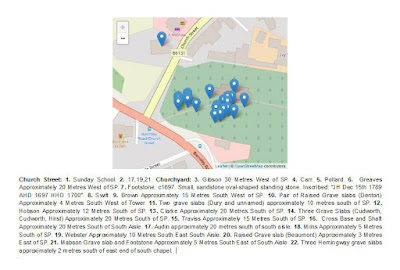When preparing for my day out to visit All Saints church in Darton, as usual, I entered a postcode into the British Listed Buildings website Photo Challenge and the results included 18 Grade II Listed graveslabs and one footstone in the churchyard.
Using the British Listed Buildings map and the approximate locations provided by the Historic England listing, I set out to look for these – mainly graveslabs that are laid directly in the ground, with a few others that are slightly raised – while the sun was shining.
 |
| The graveslab of Nicholas Carr |
The graveslabs that I was searching for range from 1653 to 1759 and algae, lichens and moss have become firmly established, which makes it often very difficult to read the inscriptions and distinguish the listed graveslabs from those of other family members.
After a few minutes of searching, it became very overcast and eventually started to rain and, having made some inroads into my list of graveslabs to photograph, I had a good look at the interior of the church before coming back out into the sunshine to find the rest.
 |
| The Gibson graveslab |
I am by no means an expert in the history of letter cutting, but I always like to see Old English style text and the interchangeable use of 'here lieth and here lyeth’ and how the English language changes into the modern form as time progresses.
 |
| The Swift graveslab |
My objective was to obtain a set of general record photographs for the British Listed Buildings website and I didn’t spend any much time looking at the inscriptions or the moulded surrounds and other finer sculpted details, which can often be seen on the corners.
Eventually, with the sun still shining, I managed to find all of the graves on my list to photograph, but very many of them are laid out in family groups. I can't see any reason why I should see them again, but if I did I would use the Historic England map to find them next time.
Before I set off to explore further parts of the churchyard and then to look for the Commonwealth War Graves Commission headstones, I had a very quick look at the Grade II Listed gritstone cross base and shaft, which is possibly mediaeval.






No comments:
Post a Comment